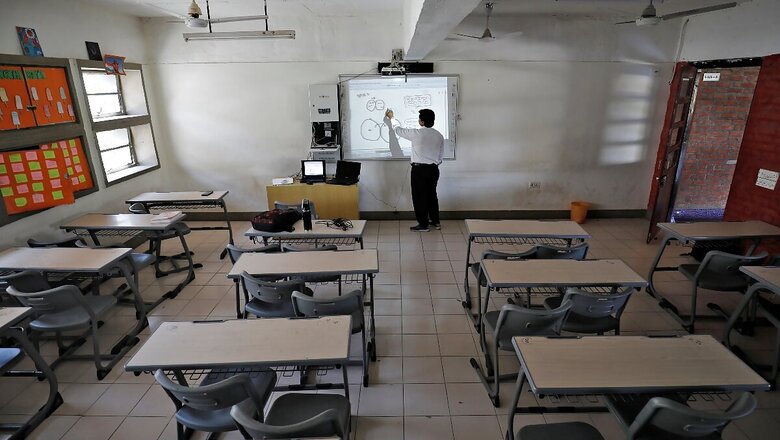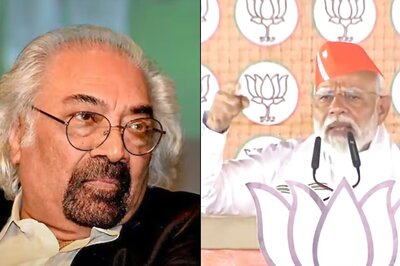
views
The emphasis on human development approach in recent times and its recognition by the UNDP and also in MDG followed by SDG has ensured the development of education under the supervision and regulation of the state. Concomitantly, the human capital formation has evolved as one of the important segments for investment as recognised worldwide.
Interestingly, India’s ancient system of “Gurukul’ tradition was mainly focused on holistic development of a child through a rigorous process of teaching, learning and training in all vocations of life for the transformation of a skilled manpower at the exit. That education system used to produce quality manpower and contributed to nation-building inculcating values and traditions.
The observations of Lord Macaulay in 1835 say: "I have travelled across the length and breadth of India and I have not seen one person who is a beggar, who is a thief. Such wealth I have seen in this country, such high moral values, people of such caliber that I do not think we would ever conquer this country, unless we break the very backbone of this nation, which is her spiritual and cultural heritage and therefore I propose that we replace her old and ancient education system, her culture, for if the Indians think that all that is foreign and English is good and greater than their own, they will lose their self-esteem, their native culture and hey will become what we want them, a truly dominated nation.”
This clearly indicates India’s rich culture, ethical values and traditions. Unfortunately that long tradition has been ruined through a systemic process at different points of India’s colonial history, Mughal, British, etc. The emphasis on British system of education for producing ‘babus’ for supporting colonial interests as decided by Macaulay in his minute, “We must at present do our best to form a class of persons, Indian in blood and colour, but English in taste, in opinions, in morals and in intellect”, transformed a class of youth in that traditions.
Macaulay rejected Indian languages as against English as medium of instructions. Unfortunately the British legacy continued after independence though several commissions and policies adopted like University Education Commission (1948-49), Mudaliar Commission (1952-53), Education Commission (1964-66) under DS Kothari, National Policy on Education, 1968, 42nd Constitutional Amendment, 1976-Education in Concurrent List, National Policy on Education (NPE) 1986 and NPE 1986 modified in 1992 (Program of Action, 1992) since then.
Initially the 10+1+3 pattern was introduced in the country followed by 10+2+2 pattern and then replaced with 10+2+3 in the post-independence period. The basic premise of education policies since independence was to maintain continuity of British system and failed to emphasise on creating strong foundation with special skills for the pre-primary and primary level with thrust on Indian languages, values, traditions and ensuring quality.
At the same time, all these policies also undermined vocationalisation of education system for skill upgradation in truest spirit. The Annual Status of Education Reports over the years highlighted gloomy state of school education in India in terms of learning and knowledge gaps at different levels and proficiencies of mathematical and languages skills.
Similarly, higher education despite tremendous increase in the number of universities/university level institutions and colleges since independence has been plagued with problems of quality, equity, access and financing. As a result the employability rate of Indian graduates has been very low over the years which increases the rate of unemployment among even highly educated Indians.
Another disturbing scenario is the large scale underemployment in different sectors which questioned the legitimacy and quality aspect of India’s higher education.
The National Education Policy (NEP) 2020 is the outcome of continuous deliberations, debate, discussions and consultations involving people at large in the country with inputs from best practices worldwide during the last couple of years. With the initiative of Bharatiya Shikshan Mandal (BSM) emphasising on the resurgence of the Bharatiya system of education with focus on Indian culture, values, languages and traditions, the policy document aspires India to regain its status of world leader in the coming days.
The Indian higher education system is one of the largest in the world. It is to be noted that around 55% of India’s population today is less than 27 years old; it is estimated by UNFPA that the window of demographic dividend opportunity will be available till 2055 in India. This posed a critical challenge for India to focus on building capacity and skill formation to transform the growing young population in to human capital through effective manpower planning. It is imperative that they are provided with better quality education, creation of avenues for their gainful employment; and prepare them to compete globally
NEP: A new paradigm
The new policy envisaged India for transformational change in the sphere of human development through capacity building framework with skill orientation since the early childhood. The higher working age population with concomitant decline in dependency ratio will lead to higher economic growth followed by more economic activities with emphasis on diversification in India.
The announcement of NEP by the government is a timely intervention as in the post covid-19 world scenario there will be a shift in the pattern of global dependency paradigm towards India. The entire world is looking at India for sustaining global economic growth. This implies more responsibility for India to support the cause of global economic sustainability through enhanced productivity and also by greater mobility of young population.
With a gradual decline in the global dependency on China due to geopolitics, India will emerge as a global leader in the coming days. Moreover, China has also entered the phase of an aging population with declining working age population.
Some of the areas of interventions announced in NEP 2020 in the context of development and skill formation which will strengthen nation building efforts include:
(1) The strength of NEP includes the welcome recognition of education as a public good, rather than as a commodity to be consumed. The new policy reaffirms the national commitment of 6% of GDP as public investment in education. Incremental increase in public investment till it reaches 20% of total public expenditure has also been emphasised along with private and philanthropic funding provisions.
(2) Pedagogical and curriculum restructuring of 5+3+3+4 pattern covering 3-18 years of children’s will lead to strong foundation for Early Childhood care and Education (ECCE) with emphasis on Indian languages targeting 100% GER by 2030. This provision will ensure nurturing early and holistic development of children with a visionary outlook and enhancement of capacity and skill formation with systemic approach.
(3) The emphasis on no heard separation of curricular, extra and co-curricular activities along with borderless boundaries among arts, science, vocational, sports and academic spheres will enable all round development of children with universal approach as existed in many developed countries right at the moment. In fact, special provision has been made for the vocational and skill up-gradation. The importance of liberal education will ensure mobility of students across disciplines with flexibility of learning pedagogies.
(4) Teacher recruitment in the schools through a process of TET, NTA test and teaching demonstration and regular in-service training will ensure quality and National Professional Standards for Teachers will be framed by 2022. The framework for teacher education with restructuring B.Ed education has been undertaken for professional development of teachers. This will go a long way in ensuring quality and capacity building of teachers.
(5) In the sphere of higher education decision has been taken to create large multidisciplinary universities, colleges with creation of HEI clusters and knowledge hubs. This will enable flexibility and mobility of students with Choice Based Curriculum System (CBCS) in truest sense of the term. This will also enhance competitiveness of our HEIs in the global ranking framework and ensure employability of Indian graduates in job market.
(6) The importance of open and distance learning with technology enabled framework focusing on artificial intelligence will lead to wide choices open to the students of higher education. Similarly the provision of Academic Credit Bank depository will ensure flexible of entry and exit at different layers of degrees, viz, certificate, diploma and degree enabling large number students to complete their courses without any hindrances.
(7) The decision to create four independent institutional verticals, viz, National Higher Education Regulatory Council, General Education Council, Higher Education Grants Council and National Accreditation Council will ensure regulatory framework with transparency and efficiency. Similarly the institutions like National Research Foundation and National Educational Technology Forum will ensure sustained research funding and technology up-gradation in all spheres.
(8) The policy document aspires India to be destination for international students through a system of transfer of credit with collaborative efforts for exchange programmes with best Universities abroad. This will ensure regaining Nalanda traditions in which India was a centre of attractions for all countries across the world.
These are some of the highlights of the decisions in the NEP 2020 in the developmental perspectives. There are several other important decisions undertaken in the policy documents with a target centric approach for transforming Indian education system rooted in Indian ethos for creating an equitable and vibrant society. More emphasis has been given on ensuring quality both at schools and higher education levels. Ensuring quality education is required to develop good, thoughtful, well-rounded and creative personalities.
It is a fact that the coming decades will belong to India in terms of regaining the status of economic super power and human capabilities. British historian Angus Madison estimated that in 1750 India's share of world's manufacturing output was 24.5% and that of the West (including America) was 18.2%. Even during early part of British rule, China and India combined used to produce nearly half of the world’s economic output in 1820 compared to just 1.8% for the U.S. The British rule ruined the rich economy of India any by 1913 India's share dropped to 1.7% and the West's share increased to 81.6%.
The idea of self-reliant or self-sufficiency as pronounced in “Atmanirbhar Bharat’ is not going back to some idealised past. A self-reliant India does not mean that our country would be an isolationist country. It is going forward to a new and confident economy with empowerment of local economy linking with global. It does not mean disconnecting globalisation rather strengthening domestic economy to face global competition. The innovation and technology up-gradation will accelerate the production of quality indigenous goods in India. The NEP 2020 in this respect will ensure strengthening the five pillars of self-reliance like economy, infrastructure, governance, democracy and demand by creating a strong base of capable manpower towards inclusive development.
However, the challenge before the government is to create atmosphere for smooth phasing of this transition stage along with efficiency in implementation and transformation. Most of these will depend on the participation of government institutions at different levels – centre, state, local, etc.
At the same time, the public at large must participate in this process of transition for making a new India. Government agencies need to be more accountable to the public as customers with transparency and accountability.
The NEP 2020 will definitely prove to be a significant feather in policy perspectives in India in the coming days. A robust implementation of NEP will holistically transform Indian education in to world class status. To quote Swami Vivekananda, “Education is not the amount of information that we put into your brain and runs riot there, undigested, all your life. We must have life-building, man-making, character-making assimilation of ideas”.
As India is on the point of a major change, the NEP 2020 will ensure restoring the credibility of the indigenous man making education system.
(Views are personal.)



















Comments
0 comment